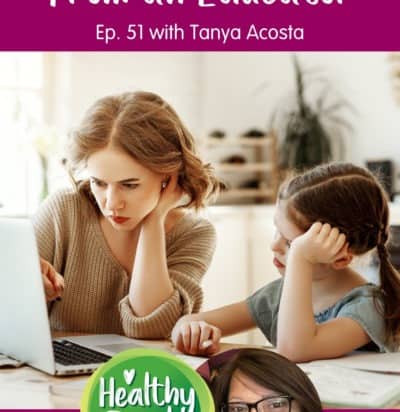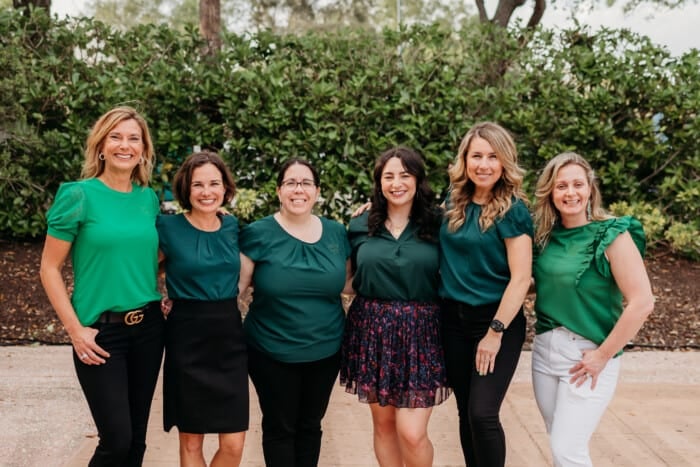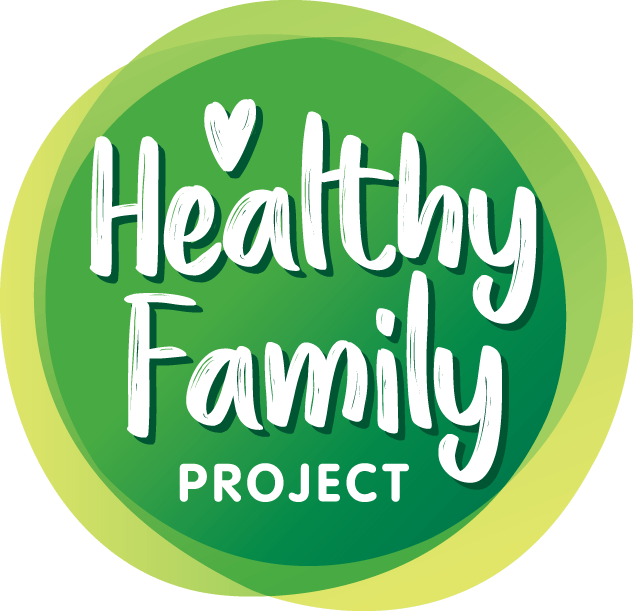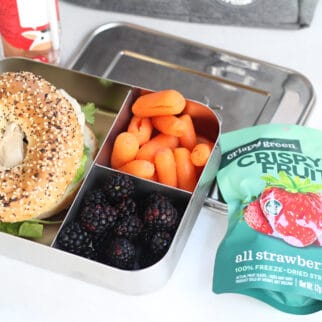Episode 51: Distance Learning Tips from an Educator
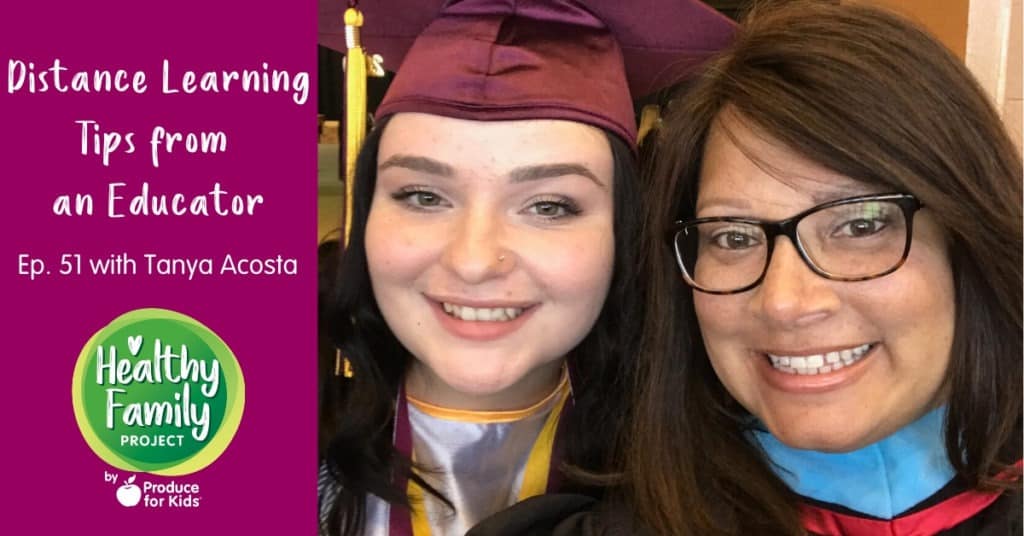
In this episode of Healthy Family Project, we talk to Tanya Acosta about navigating distance learning. With states around the country announcing school closures for the remainder of the year, distance learning is our new normal.
We invited our long-time friend, Tanya Acosta, an elementary school educator with 16 years of experience, to share distance learning tips for success.
Tanya covers setting schedules, creating a designated school space, adjusting routines based on your child’s needs, and lots more to keep kiddos on track while remaining flexible.
Tanya has worked in the education field in different variations for about 16 years. She is certified in elementary education K-6, Exception Education (special education) K-12 and have a reading endorsement for grades K-12.
She has worked in the elementary capacity for most of her career as a classroom teacher and ESE teacher. She spent four years as a reading MTSS coach working with teachers and training them on reading instruction and how to implement interventions for their students.
Listener Survey!
Thank you so much for supporting the Healthy Family Project Podcast! We’d love it if you could take 5 minutes to let us know how we can bring you the best possible content for future episodes. Take the survey here.
Healthy Recipes & Tips in Your Inbox
Sign up for the Healthy Family Project e-newsletter to receive healthy recipe inspiration, our latest blog posts and more directly to your inbox each week.
Healthy Family Project Facebook Group
Join our Healthy Family Project Facebook group! This group will serve as a safe space for parents and caregivers to talk all about raising a healthy family – from dealing with a picky eater and tips to get more fruits and veggies onto plates to exercising as a family and mental health. We welcome all of you to join in!
Want to skip straight to a hot topic? See time stamps below. But of course, we recommend listening all the way through!
- 4:16 Distance learning tips & tricks
- 8:43 Tips for setting up a dedicated distancing learning space in your home
- 15:11 Routines to put in place to help your kids stay on track
- 18:45 How much time should students be spending on school work?
- 24:26 How much flexibility to allow right now & thoughts on lowering expectations
- 27:30 Student retention during distance learning
- 34:02 Advice for parents who aren’t home during the day on how to check in on school work & keep their kids on track
- 36:56 What does a healthy family mean to you?
Relevant Links
- Keeping the Peace When You’re Stuck at Home
- Helping Teenagers Cope with COVID-19
- Resources to Survive Quarantine with Your Family
- Ask the Psychologist: Screen Time & Kids
Other Podcast Episodes to Check Out:
- Episode 50: Managing Kids at Home During Coronavirus
- Episode 49: Coping with Stress & Anxiety during the Coronavirus Pandemic
- Episode 48: Self-Care for Busy Families
Healthy Family Project Podcast
Conversations covering hot topics in the world of health, food and family with a dose of fun. Helping families ease their way into a new fresh and healthy world.
Be on the lookout for new bi-weekly episodes and don’t forget to subscribe on Apple Podcasts, Google Podcasts, Spotify or your favorite podcasting site. If you like an episode, make sure to leave a rating and comment.
If you are interested in being a guest on the Healthy Family Project podcast, contact amanda@healthyfamilyproject.com with your topic idea for consideration.
Transcript for Episode 51
This transcript was produced by Otter.Ai. Please forgive any misspellings and grammatical errors.
00:09
Welcome to the healthy family project by produce for kids, covering the hot topics in the world of health,
food and family with a dose of fun. Hi, everyone, I’m your host, Amanda, welcome to this episode of the
healthy family project where we are talking about distance learning. Don’t this again, I know I say this all
the time stress free zone, we’re going to keep it simple. We’re going to keep it to the basics of what we
need to do to make the best of this time and keep our kids moving forward. Don’t forget healthy family
project, we have our Facebook group, which is really important at this time, we have lots of families
interacting over there asking questions. And our guest today is a member of the Facebook group as well.
So she will be over there continuing this conversation in the group. So today we are talking with Tanya
Costa who is first and foremost one of my best friends. We’ve known each other you know, I moved to
Orlando and met her soon after moving to Orlando, and she has always been there for me whether you
know, whatever it might be, but especially in the education department. You know, when I’ve had
questions about what my kids are, are facing or how she’s amazing. When it comes to advocating for
students. I know as an educator, she worked with many parents, you know, so that they could
understand what options they had for kids who are in different situations. She’s helped a lot of, you know,
people in my world that she she didn’t even know. So just a great person in general, but also crazy,
amazing background. So she has worked in the education field in different variations for about 16 years.
And she is certified in elementary education, K through six exception education, which has special needs
K through 12. And she has a reading endorsement for grades K through 12. So she’s worked in the
elementary capacity for most of her career as a classroom teacher and ESC teacher, she spent four
years as a reading MTSS coach and working with teachers and training them on reading instruction and
how to implement interventions for their students. So just about, you know, a little bit of everything. Plus,
she’s a mom of two boys. And so with all of that we’re hoping today that we can kind of walk through
what this distance learning landscape looks like for us, as parents and families, and see what we can
what tips we can get. So all right, I know I’m ready to get some info. So let’s get started. Hi, Tanya, it’s so
wonderful to have you on the show today. For many, we’ve just received news that school will be
canceled for the remainder of the year. And I think we all knew that announcement was coming. But I
guess just hearing it and seeing it and writing. It just made it very real. And I know that I had a hard time
with it. I don’t know that the my third grader had had a super hard time with it. She’s just kind of like a are
okay. But definitely my middle schooler eighth grader was was pretty devastated. So we are excited to
have you on today because of the school cancellations. That means that distance learning continues. So
I know that you have an extensive background in schools and different settings. So I wanted to really
pick your brain and see if we can get some tips and tricks to take us through the the end of the year. And
really, you know, who knows, maybe these are I’m sure things that we can carry on into next year when
we’re back in school. And hopefully this doesn’t happen again. But just in case, you know. So welcome
Tanya. We’re you know, excited to have you.
04:16
Thanks. Thanks so much for having me on today. Um, yeah, the news is definitely unfortunate. In so
many ways. I am. You know, fortunately, I’m staying home right now. So, I think for me, it’s a little bit
different. But my heart goes out to parents that are working full time and having to work with their kids in
this facet. And I just can’t imagine because my kids do overwhelm me at times with the amount of work
they have to do and what they have to complete. And just work habits because it’s different at home than
when they’re in a school setting. Like no matter what, we can’t change that part of it. But also my heart
goes out to families with graduating students and or kids transitioning from you know, school to school,
there’s just so many things that kids are missing out on. Especially like, our traditions and the graduation
and prom. I felt like were huge things I looked forward to when I was a senior in high school.
05:13
I know, right, I keep putting myself back in. I think that’s like, part of the, you know, like breaking my heart
because I keep putting myself back into that position. And it’s like, oh, wow, if someone told me I couldn’t
do all of these things, I would be a mess.
05:36
No, I completely agree. You know, yeah, I, it’s just heartbreaking. It’s heartbreaking for the families to
because they’re, they look forward to that opportunity with their child, like not even just the child, it’s
everyone. So it’s, it’s hard. But I do think the positive is getting out of the grind that we got ourselves
stuck in. And because I feel like for us, we had sports and Boy Scouts and music lessons and their
individual sports lessons and concerts and shows like, it was just like, every day, we were like, running in
and running out. So I don’t miss that. And I feel like that’s definitely something as a family, we’re going to
take into consideration when ever it is that we go back to whatever the new normal is going to be. Right.
Um, I just think the quality time has been better than what I thought it was going to be. For us anyway.
Um, but I think that is definitely a big positive. It’s just the valuable time having together and just even out
in the neighborhood, everybody’s riding bikes together, they’re gone. Right? Gather, like you can, like I
sat in the driveway. And it’s just everybody’s walking around and saying hi. And they’re smiling. Like, it’s
just different. Like you didn’t have time before to enjoy your neighborhood.
06:57
No, they had something to force us into this right, sadly, but I hear ya, I mean, we, you know, our family is
also on the go all the time. And, you know, even the virtual dance classes have been we’re a granted we
have a little bit of space that we’ve set up to make it work. But I have thought like, wow, I’m driving to
dance class three nights a week, we could be just been doing this year on a zoom call, you know, like,
wow, that is just like, mind blowing. But I agree with you. It’s definitely a time of like reflection, and really
examining what my day looks like regularly. And granted, I prefer to not look like what it looks like right
now. I need like a happy medium, but I’m with you definitely. Probably gonna get to examine everything
that we’re we’re doing as far as extracurricular and those types of things. Yeah. So
07:54
yeah, no, I agree. And I agree that, like the kids music lessons, or online, so literally sit there with the
iPads, FaceTime, and their computers are open for the music, and they’re with their keyboard or guitar in
front of them, but they’re getting it done, and I’m not going anywhere for them to do.
08:09
Right. Alright, so let’s jump in here. I think that for distance learning, a lot of people have had want to
know, like, what kind of space do I need? And I know it’s different for everyone. So what are your
thoughts? So of course, like I said, taking into consideration we don’t have the same amount of space in
our homes, we have apartments, condos, houses, you know, now sharing space with extended family,
you know, college students who might have returned home and so like, what is a good optimum space,
because I know that’s important for learning.
08:43
I think the consistency of the space like the child, every child needs some type of routine. And I know
everybody’s saying oh, we ignore the routines and ignore this. But there’s the reason why they like going
to school is that security and that sense of routine, and it’s something they do when they know what to
expect, right? So not trying not to shove them in any corner on any different day is best, even if it’s just at
the kitchen table because we all have a kitchen table or a barstool or like that, that’s their space, like
you’re gonna wake up, do whatever you have to do, and then sit in your space and like let’s get logged
on get your attendance done, like do what you got to do to get started. And I think a big part of it is
ergonomics, like how they’re sitting and teaching them like proper placement for the keyboard and
especially for the younger kids that don’t know like wrist up and all of that like to put to roll a towel at the
edge of the keyboard to rest their wrists on to avoid that like long term damage. Right and I I bought my
son’s because my older son struggles with headaches anyway. So I got him like on Amazon cheap pair. I
bought them both because you know you have to do for both. But I got the blue light glasses
09:55
that way. Oh, I need to do that. Yeah.
09:59
So if That would help with the headaches and with the longtime staring at the screen. So they wear them
every day. And they because one doesn’t work glasses and one does. But it doesn’t, it’s like so excited to
have glasses
10:11
well, and you know what we can do to share that link with me that Amazon link and we can add that to
the show notes. So anyone listening who wants to grab those, which I will, can do so.
10:24
And I literally bought a two back it was like $13. And I just like if it doesn’t work or retainer, like return it
like Amazon’s amazing with that. But they said it helped. So I mean, I don’t use them. And I’m not on the
computer all day like them, but so I feel like whatever to have them complain less is worse. That’s the
truth. Um, but yeah, like, for me, personally, my kids had those cheap, like Ikea desks. It’s just like a table
desk for them to do their Legos and whatever on. So I move them into my living room, because I need to
watch my kids, they’re not the independent, I can do it on my own, I need to like, physically see screens
and see what they’re doing and look at what they’re doing. And maybe it’s just me, because I slightly
control things a lot. But I just think that, for me that worked and it’s cluttering my space a little bit. But in
the end, it’s what works best, because I didn’t want it on my dining room table because we’re
appreciating the fact of like sitting and having dinner together every night. So it was like annoying to clear
their stuff away and to put it back. But that’s why I also say half have been to put their laptops in to put
their books in to like that way, when they clean up when they’re done. It all goes in a bin. And every day,
that bin is their go to. Like I actually had extra like those cloth bins or whatever. Also. So I just lined up up
like my older son is taking three high school classes. So those are humongous textbooks. So has been
quite full. Yeah, that’s a good idea. Yeah. So that way, their pencils, their pens, like they have ball
supplies, in their bins and on their desks, and that’s their space.
12:02
That’s a good idea.
12:04
Whatever works for you. I do like the bin idea. Because that can work for anybody. And especially when
you have them working in your space, like on the dining room table that way, it’s you can like at the end
of the night, look at your house and not see where
12:18
all right. Well, we have Trish on our team, she has her son shoot, when we were talking about this
episode, she said, I keep putting him in the space, we set up to do His work, but he keeps like, wiggling
his way back into my office where she’s, you know, working full time. And she said was, you know,
thinking like, Well, I’m not teaching him to be independent. And, and I told her, you know, hey, he’s
getting his work done there. You know what is but she was saying please talk to her Do I need to put him
back into his own space.
12:52
I feel like if your child is capable of not interrupting your workday, I don’t see any harm in it. It’s just what
works best for you. And I honestly think it’s like, we’re in survival mode with this. Like, it’s how can our
day go smooth this that way, by the end of this, I’m not spending my summer recovering from, like,
having being upset with my child all the time. I’m a, you need to find the peace for your house and
everybody’s house is going to look different and how everybody does it is going to look different. And
that’s okay. And if your kids next to you, and He’s not bothering you, but they’re working, I would have my
kid sit next to me all day if he would just do His work, right. You know, not every kid is capable of doing
that. But I it’s fine, as long as they’re independently working. And it depends on how old they are. Like I
just because it’s like Distance Learning doesn’t mean that they’re capable of doing practices
independently, right? And that’s where like they need to communicate with teachers and maintain that as
well. Because you can’t take on the brunt of all that either. So
13:56
whatever works for you. All right, perfect. So alright, so we got the space down. And now you’re
managing two boys Distance Learning at home. So how do you split the time? What does your schedule
look like you split your time between the two also managed to secure time for yourself to either work. I
know you have several projects that you are gone and then you know getting things taken care of around
the house feeling sane. But so being that your boys are older, do you have like office hours you set for
them when you’re available? Or is it just kind of come to me whenever you need something? I’ve heard
people setting time boundaries for older you know, those older kids, I actually, for me today just
designated and I’m working full time but I designated but I’m able to shift my hours to I can get some stuff
done in the evenings. But I said from three to four. We’re going to do coffee with mom. And for that time,
we can talk about schoolwork if there’s things you’re missing we can talk about like Life stuff. Or we can
talk about what’s, you know, on your mind. Anyway, sorry, I’m kind of like rambling on. But what are you
thinking about? Like,
15:08
what a great idea. I think, again, however it works for you. The way I do it is I sit down every morning with
them. And I go, CJ is my older son. So with him, I go through his Gradebook, and his assignments, and
like, what are our goals for today, what’s due by this date, what’s like, we put an order what the day is
going to look like and what assignments he has to complete that day. And then, so that kind of he can
work pretty independently. But it’s just to give him an outline. Okay, these are my goals for today, this is
what I have to do I have these calls at this time. So I know I can’t work, then we like we do want at the
same time every day. And so we kind of keep a schedule like that. And I do basically the same thing with
my younger one his teachers assign every day. So we just look at what they assigned for the day, what
he has to do. And his I make more of like a box, so he can check it when he’s done. And his biggest
struggle is writing. So I’m like save writing for last. And that way I can sit with him. And since I am
experienced and trained and how our county does writing, I can sit with him and actually teach him one
on one because that’s what he currently needs. And I have the time to do that. But other than that, we
just kind of have like a morning conference, and what are your lists? What are we doing, and that way,
they have accountability for what they need to complete for the day.
16:30
I like that, yeah, that’s how I’ve Mia, I’ve been on her about her planner, she’s she’s not the best at time,
organization, time management. But she’s really been working hard. And every day, I have her look
through her work and map out what she needs to get done. Same thing. And so her planner has been
full, and she’s really learning. So hey, maybe another positive here. You know, my non tamp time
management child is learning forced into learning how to, you know, independently manage that time,
which I think is something a lot of kids, you get to college and all of a sudden, you know, it’s like, I know,
for me going to college now just that we’re having this conversation, it was like, Oh, wait, I have no
parents here. No one’s telling me to go to class. And by the way, I did go to class. And you know, just in
case anyone’s wondering, I did go. But you know, it’s just like, oh, and I have to manage my time. And
like there’s office hours the same way. Right now with distance learning, the teachers have office hours.
So I think this is giving really giving our kids a sneak peek into that kind of next next step, I guess? I don’t
know.
17:43
So no, and even CJ takes lots of breaks during his time. So that’s why in the morning, when we check in
on like, Okay, what questions you have to ask a teacher, like, make sure you post them now, that way,
when they’re in their office hours, they can respond to you. And we can get that done. Right. So
18:01
today, right? All right. So let’s talk about we’re talking about time here. So I know every school district is
different. But you know, over in the healthy family project, Facebook group, and I know conversations, I
have friends across the US like you as well. And there’s just different people saying, Oh, my kids spend
two hours on schoolwork. And then you know, my kids are spending more like five hours. And I’m like,
okay, is that? Are we doing something wrong? Or do we have too much work? And so is there a magic
number for students? Like what? How much time should they be spending? And of course, this is kind of
a hard question, because all students learn differently and at different speeds. But what are you thinking?
18:44
Yes, um, I think that, yeah, it’s very specific to the child. And I think we need to try our best to not put a
restraint on them, like you have to have this done in an hour. Because I feel like that right, there starts
the anxiety and the stress for them. And this is already a stressful situation for them. And there’s lots of
data out there that show like, you should only give this amount of work, or you should only give this, but
the time in which the kids complete the work is completely different. Because you have kids better
English language learners or special needs or are just having difficulty in reading comprehension. So it
takes them like twice as long. You can’t hold that against your child and expect them to work within the
norm, like everything, the bell curve. So you have kids that can do it really fast, and you have kids that
can do it really slow, and then you have most that are within that broad range of average. But um, I just, I
think honestly, you just have to know your kid. And if reading takes them two hours, then you might have
to break that up for them. I just feel like the amount of work could be the same for five kids and I’ll take
five kids five times Different times to complete the work. So I just think it’s just knowing your own kid and
modifying what they’re being given to make them the most successful and feel successful. Because at
the end, they need to complete it and feel some kind of success fill as if they were in the classroom, it’s
really comes down to that I wouldn’t communicate with the teachers, that’s huge. Like, if you feel like, if
you know, your kid is struggling, and they’re having a hard time, like teachers are still working, like they’re
still being paid to be teachers. So take your time to communicate with them as a parent, and advocate
for your kid that it’s taking them this long, like things might be late and whatever. And most teachers are
pretty are responding pretty positively to, to those things. Because as long as the parents are engaged
and communicating with them, or the child is that is a tremendous help. And it’s getting the kids to
advocate for themselves like this is a great opportunity to do that. Like they can email the teacher and
you can work with them on how to email and what to say, like I’m really struggling with this or like even
my mom son had a reading comprehension question. And I taught English and I didn’t really know what
she was trying to ask. So it was like, just email her and she explained it for him. And we were able to get
to the answer. So it’s just a knock getting stuck. Kids get stuck, watch out for that, yes, be a problem.
And they sit there for an hour on one level. So be aware of that, too. And that move on and we’ll go back
to it and send an email to your teacher asked me about their question, because that was like the first
week I realized with CJ like he was getting stuck, and not doing anything, and it was taking forever
because he was stuck. So just things like that. But there really is no magic number for anyone, because
we’re all so different.
21:48
Well, on that note, too. I know, I had to force myself to take some time. And again, I’m lucky to have a job
that I’m able to kind of take a pause and step away from my desk. And but, you know, I think it was such
a big learning curve. For even both of my kids are so outgoing, but they didn’t want even though their
teacher posted office hours. They didn’t want to bother their teacher, like they would maybe send an
email. But the teachers kept saying I’m available for a call, or I’m available for a video chat, you know,
and I it took a long, like I say a long time right now everything feels like a long time. But like, it took over
a week for me to get them to understand, especially for me, who’s an eighth grade? You know, like, she’s
asking her friends questions. And I’m like, you have a teacher who’s sitting there who is a bit available to
you. Like, why not take advantage of that one on one, you know, and some of the teachers too, because
I don’t know a lot of eighth grade eighth graders who are like, yeah, let me jump on a video chat with my
teacher. But the ones I have kind of forced her into talking through, she’s done really well on the
assignments, and the teachers were happy to see her and happy to interact and have that, you know,
person to person. So I think we’re slowly getting there. You know, with
23:10
some of that, because even CJ in that first week, was like, I don’t want to ask the question, I’ll feel stupid.
Yep. Well, you need to complete it. And I can’t, yeah, define what your teachers asking for. So you need
to ask questions, that’s what they’re there for. you’d raise your hand in class or call them over to ask a
question. It’s the same thing. You’re just doing it through the computer.
23:33
Right? Well, so I keep hearing people say that, you know, you kind of mentioned this a little bit, but it’s
okay for parents to lower their expectations and not have, you know, schedules, like you just said about
schedules. And, you know, everyone’s dealing with a level of stress and uncertainty. And I’m totally okay
with lowering expectations right now. That’s cool. But the girl the work the girls are getting, and still goes
in their gradebook. I mean, I know some I’ve heard some places in the Northeast have moved to a pass
fail. When on the fence on that, my thoughts on that? I haven’t really, but you know, for us are the
expectations from our district haven’t lessened. Like, I could lower my expectations, but the grades still
have to be turned in. And I don’t know. So what are you? What are your thoughts?
24:26
Again, probably because I have an educational background, I slightly differ. I think we still need to have a
high expectation of our child. I think, if anything, we can use this moment to teach them that things
happen in life, and we can’t control it. But you have to continue on and you have to move on. We can
modify by allowing different times to do it. If your kids a night person, allow them to work later. They don’t
have to work during the day. Like you can modify things. But I think as far as expectations like for me, I
personally still expect high quality work to be completed, like it will not be turned in until it’s high quality
work. And I can’t check every assignment, obviously. But, um, I don’t think that expectation has changed.
But I do email the teachers if we’re running late on things, and I communicate with them for those types
of things. But, um, I think there is a flexibility that we’re allowed to have. And the modification is different
than the expectation, and I still expect them to do the right thing.
25:33
Right, I think I’m on, I’m on your page two, I think that you stated that really well that it’s more about a
modification than an expectation. So if you can modify, you know, that makes that will make things
probably feel easier.
25:54
No, yeah. And it’s accommodating to your you can, for the first time accommodate to the educational
need, and my kids don’t function great first thing in the morning. So we don’t start all day till like, nine
- And that’s fine. That’s what works for us. But some kids have there some other kids starting at 738
o’clock, as if it was a school day. And you know, we stay up late, we’ll watch a movie at night. So those
are things that we’re changing, and we’re adapting our day to that. So it’s not like we’re perfect in the way
I do, it might not work for everybody either. So I think, again, it always comes down to what works best
for your family, and how you can get it to go without the stress and the headache of it. All.
26:33
Right. All right. So let’s talk about retaining what we’re learning during this distance learning time period.
You know, I’ve had different people talk about, you know, how is it even possible for these kids to move
into their next grade level with ease, when, you know, this is just kind of been thrown upon us. And I
even know, several of moms in my, you know, Mother via Facebook group or whatever group online,
have expressed, that they’re going to hold their kids back next year. And, you know, because they fear
they’ll be behind and do them and injustice by pushing them on when they’re not prepared. I guess
keeping in mind different school districts are offering different levels of support. And learning to this is
another one. I mean, I feel like all of these topics are like so different across different school districts. But
anyway, what are your What are your thoughts? I know, it’s a hard one.
27:30
Um, I think practices always good. I think a lot of the work that they’re getting is busy work, just to make
sure that they’re working and they’re doing, it’s still standards based, it’s still hitting what they’re
supposed to be working on. And most of the teachers, for my kids have been actually upgrading them
and giving them feedback. So that’s been helpful. Um, so as far as what they’re specifically retaining
during this time, I think that depends on the child and the effort that they’re putting in. And if they’re
actually trying to work through it and understand it, and, and if they have the teacher or parents support,
of course, that’s a help. As far as actually retaining the child as a grade level. That’s a really complex
question. Um, especially Okay, here in Florida, which I feel like we’ve discussed before. Like, we only
had nine weeks left in the school year when they started, I can imagine dismissing the other three
quarters that they’ve already done for one quarter, especially when the fourth quarter is primarily testing
like they would have gone back to school and any student, third grade enough starts FSA testing. So
they would have been testing for writing for reading or math or science, everything. And then the EEO
C’s at the middle school and high school level. Like there’s so much testing going on, like, what are they
really retaining anyway, in that quarter, and this is coming from an educator, like, as a teacher, it’s hard to
make sure that they know what they’re doing, and that you’re still teaching during that time, because
you’re being moved around, like the last quarter is a really hard quarter no matter what. So I honestly feel
like it’s the best quarter for something like this to happen in? Um, I do think so I, that’s the retention. I
think that if your child is behind a lot, like a year or two behind academically, then there’s a question for
retention. If it’s not that big of a difference, I wouldn’t really worry about it, because everybody’s going to
be in the same situation next year. So all teachers are going like all districts are going to have to look at
what the kids missed, and how they’re going to review it in the beginning of the year before they start the
actual curriculum. So I think that is gonna have to be part of it. Hopefully, local districts are able to look at
that and are able to modify next school year to accommodate what they’ve missed this school year. But
on the side note of that, I also think people need to be aware especially In the state of Florida, that our
children are still going to be taking their end of the year assessments. I know, they still have to take it for
ninth grade English, they still have to take it. Like they still have to take these under the are testing and
they might not be taking it till October. So that’s where it goes back to like that work expectation, like they
need to do the work. Like they need to be accountable for it. Because they’re, they have the graduation
requirement here. So they have to take that test to graduate. So I think a lot of people thought that they
canceled the end of the year testing that. Well, for here in Florida that it was a shoo in that they would
just move on. But it’s not that way.
30:40
And by some people, you mean my eighth grade daughter Mia
30:48
find this out. So like yesterday, like I thought they were going to be exempted. And then a friend of mine
had stopped by for something yesterday. And she’s like, Oh, no. No, I feel like I just found that out
myself.
31:04
Yeah, that’s gonna be interesting. But like you said, I felt like they, I mean, everybody’s in the same boat.
So I think they have to take this into consideration this time period.
31:15
And I think parents of kids in other school districts and other states need to ask these questions,
because I didn’t think to ask that question. And so they you need to know what the next steps are
especially like, you know, again, with kids that are taking high school classes that are graduation
requirements, like, what are they doing? And what are they going to be held accountable for? Besides
the grades? Right,
31:45
yeah, I think that, like you said, it’s, I mean, I know, we’re all busy with our stuff. But I think that we’re just
gonna have to as parents, I know, you’ve said Be an advocate for your kids a couple of times, and really
take that to heart and, and not not jump into well, they miss this part of the year. So I’m holding them
back, like really evaluate where your kid is, you know, where they’re performing at what level and look to
the school for any resources, they might have to help you. Because there will be resources, I know that
there has to be all no matter what school district you are in. I think they’re going to put a lot of things in
place to help us recover and get back into the mix of things.
32:31
Yeah. And like, I don’t know if they’ll, like, do summer school, but I hope they offer some kind of tutoring
or something. Just like for the kids to check in, or I don’t know something. Yeah. All right, let me open
somebody,
32:47
I was just gonna say be careful what you wish for. But I hear,
32:50
especially for like that they have TP algebra, like I want some kind of review every week until they have
to take the test. Yeah, and go four or five months out taking anything.
33:01
Oh, that would be bad. Uh, you know, math is not a strong suit over here in our house. And so I feel
having that gap in time would be pretty rough to have the summer with no, no work algebra work going
on, then be expected to take their test would be tough. So I know, we’re talking a lot about having, you
know, a parent or parents at home available. The kids have access to them. They’re working from home.
I have many friends in you know, that I know, who are doctors, nurses and other essential workers who
cannot be home with their kids to help with distance learning during the day. You know, who have
teenagers at home who are helping with the younger ones? You know, it’s like the Wild West. Really right
now, what advice do you have for these parents who aren’t able to be there all day? How do they check
in? How do they know what to devote their time to looking at, and cross checking and maybe questions
to ask to help keep these kids on track?
34:02
Again, I would communicate with the teachers. And I would let them know their situation like I am a
frontline worker or I’m in or whatever, doctor, whatever you do, send an email to the teachers and like,
this is our situation at home. Like I know, I need to help my child and I’m going to do that the best that I
can. But they really need your help during the day to keep them motivated to keep them going. Like, how
would that look like with you? Or how could you help? Do something like that? And then as the parent, I
just think they’re going to be exhausted at the end of the day. I don’t. I feel like just see what work they’re
doing and what they’re not doing and like remind them and just have conversations but don’t stress
yourself out like your day stressful enough and you don’t want that time with your kids be school, school,
school school either. Like this is where that modifying can happen and Just constantly communicate with
your child to and let them understand like, it’s, it’s not fun, but you have to be more accountable for what
you’re doing during the day. Like you need to help out, you know, mommy or daddy, like whoever the
single parent or grandparents out, like whoever is their guardian. And really they should communicate
with the teachers and let them know. And just say like, it’s hard, and what has to be done, because a lot
of these assignments don’t have to be done. They’re not being graded. So they can also ask questions
like, what exactly is being graded, that has to be turned in, that I have to hold them accountable for,
versus just the work that they’re doing as a preview or as whatever. So those are questions that they can
ask.
35:47
That’s good. Yeah, definitely communication with your teacher, if you’re out there as an essential worker
at this time. I think that teachers, you know, are in their office hours ready to answer and ready to help
parents as what I have, like kind of witnessed so far with my interaction with teachers and the kids
interaction with teachers. So I think that’s probably the big takeaway there is just to really, you know,
share your situation and keep on top of just those key items that you need to make sure turned in. So
36:21
definitely don’t be afraid to ask what’s being greeted? Like, what, because that’ll help decrease your
stress. Yeah. And you can still have them do that work. But like, this has to be done first. And then when
you’re done with all of this, you can do this kind of thing. Yeah, and set up their day.
36:40
Okay, so your new guests on the podcast. So I get to ask you this question that I’ve been asking to all of
our new guests, and there’s no right or wrong answer. It’s just fun to hear what everyone thinks. What do
you think being a healthy family means? It’s all my questions today are like, not easy, not easy.
37:06
I think to my family being healthy, we take all the facets of health, to consider it like to be healthy. Of
course, eating healthy, I’m drinking water, we’re huge. Like, we don’t even have juice in our house. I think
we bought it now, because we felt bad during the quarantine. But we urge big water drinkers. And the
kids know to drink half their body weight and water a day. Just for skin health, because you know, CJ is
hitting that acne age, and I don’t want him to have bad acne. I know it’s been but I worry about it. Um, but
I a huge component for us, I would say is the mental health aspect is like, it’s such a different world
today. And we just like try to come together at some point every evening or whatever, and just talk to the
kids and like what’s going on in your lives? And what’s going on your days? Like? Who are you hanging
out with? Like, what type of people are they just taking that time to know them and to know what they’re
struggling with? Because I mean, it’s honestly gotten to a point where there was a point where CJ
needed help beyond what we could help him. And we did that for him to help him through a time in his
life. And we would do it again if we had to. But I don’t think you can be healthy physically, if you’re not
healthy mentally. That’s for sure. I think for us, and because of things we have going on in our family. It’s
just that’s a huge thing for us right now is, you know, being healthy is overall, a strong week for us is on
mental health.
38:50
Yeah, I hear Yeah. And we we’ve talked a lot on the podcast, I know that I produce for kids, we talk a lot
about what we’re putting into our bodies, which is very important. Is
39:01
very and that is I’m not even saying that that’s it completely. together all of the pieces. Yeah.
39:07
But you know, we talk on many episodes about mental health and how to manage all of that. And it you
know, if if you are mentally healthy you can or you’re probably going to make better decisions on what
you’re putting into your body to I can I can vouch for that. Let me tell you, because I’ve had I’ve had not a
great week, I’m okay with saying that this is like roller coaster, but, you know, my past week is wrong.
39:34
Time. Like where, and I’m not the healthiest person. I’m gonna say that. But I think during this time when
I hear parents, like we’re just letting our kids eat whatever and all day long and they can have whatever,
like this isn’t summer vacation, I vote and it was like, it’s not summer vacation. You’re not homeschooling
your child like, like you just need to survive, but yeah, get rid of all the norms and just be Like while were
quarantined, like, yeah, like, go outside. And, you know, we go every night for a bike ride and our walk
because I don’t ride a bike anymore. But um, like, we’re all just out there trying to get movement and be
healthy exercise. And, yeah, we’re looking at recipes and trying new ways to cook vegetables and things
like that. So the kids are more involved. So it, it’s overall, but I’d say for our family, a big focus is on
mental health.
40:26
Awesome. Well, thank you so much for joining us today. Tonya is actually part of our healthy family
Project Facebook group. So we’re going to talk it through but want to continue this conversation over
there. So if you have any specific questions for her, you can ask. We’ll link up to everything in the show
notes. Or you can go over to the Facebook group. Thank you so much Tanya, for sharing such great tips
and ideas for families. Before we close things out, do you have any other final tips or thoughts for
parents before we say goodbye?
41:02
Um, no, I think just remember that we’re all in this in the same situation. And we’re all having positives
and negatives to it. Don’t be too hard on yourself. And as long as you’re doing the best you can with what
you have in the tiny lab because, as you said before, some parents have such a limited time. Like it’s
okay, like, it’ll all be okay.
41:25
Well, that was great. I know, I’m feeling a little bit better. You know about this distance learning knowing
that I feel like I’m on the right track. I’m doing the right thing and also remembering like Tonya said, I am
definitely doing the best that I possibly can at this time, as I know, you know, we all are. So just keep that
in mind. Remember the Facebook group come on over there to interact. And then also, we have lots of
great content, relevant content, you know, whether it be long lasting fruits and vegetables or you know
how to talk with teens during this time how to kind of explain situation and definitely a lot of different good
ideas, pantry staples and different recipes. We know there are fewer trips to the grocery store. Really
taking that into consideration with all of our content. Be sure you’re following us on Instagram we’re
regularly posting over there there as well. So if you like the healthy family project, please tell a friend you
know leave us a rating it will only help our visibility so we can continue to create a healthier generation. If
you want to tweet with me direct I’m at Amanda M Kiefer on Twitter and you can find produce for kids on
Facebook, Twitter, Instagram, Pinterest, and YouTube. Be sure to subscribe Talk soon

